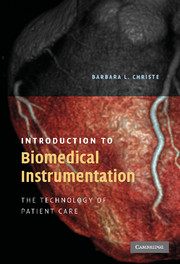Book contents
- Frontmatter
- Contents
- Preface
- INTRODUCTION TO BIOMEDICAL INSTRUMENTATION
- 1 BMET as a career
- 2 Patient safety
- 3 In the workplace
- 4 Electrodes, sensors, signals, and noise
- 5 The heart
- 6 Cardiac assist devices
- 7 Blood pressure
- 8 Respiration and respiratory therapy
- 9 The brain and its activity
- 10 The intensive care unit
- 11 The operating room
- 12 Imaging
- 13 Clinical laboratory equipment
- 14 Intravenous pumps and other pumps
- 15 Miscellaneous devices and topics
- Index
3 - In the workplace
- Frontmatter
- Contents
- Preface
- INTRODUCTION TO BIOMEDICAL INSTRUMENTATION
- 1 BMET as a career
- 2 Patient safety
- 3 In the workplace
- 4 Electrodes, sensors, signals, and noise
- 5 The heart
- 6 Cardiac assist devices
- 7 Blood pressure
- 8 Respiration and respiratory therapy
- 9 The brain and its activity
- 10 The intensive care unit
- 11 The operating room
- 12 Imaging
- 13 Clinical laboratory equipment
- 14 Intravenous pumps and other pumps
- 15 Miscellaneous devices and topics
- Index
Summary
LEARNING OBJECTIVES
1 list, describe, and characterize applicable codes of ethics, with patient safety and confidentiality as primary concerns
2 list and describe commonly used test equipment
3 list and describe safety universal precautions and personal safety measures
4 list and describe the qualities of excellent customer service
Introduction
As part of the health care team, BMETs must strive to serve the staff and patients in the safest and most effective ways possible. This chapter reviews the various ethical codes that may apply to BMETs. In the health care workplace, test equipment is used to ensure patient safety. Precautions are employed to promote personal safety. In addition, serving staff and patients requires excellent customer service skills. These important facets of the BMET workplace are explored.
Applicable codes of ethics
No code of ethics specifically and exactly addresses the needs of hospital-based BMETs. Two codes, however, have parts that apply to BMETs. First, there is the Code of Ethics from the Biomedical Engineering Society (http://www.bmes.org). Even though this group is research oriented, it does have a section that applies to BMETs in the hospital environment.
Biomedical Engineering Professional Obligations
Biomedical engineers in the fulfillment of their professional engineering duties shall:
1. Use their knowledge, skills, and abilities to enhance the safety, health, and welfare of the public.
2. Strive by action, example, and influence to increase the competence, prestige, and honor of the biomedical engineering profession.
Biomedical Engineering Health Care Obligations
Biomedical engineers involved in health care activities shall:
1. Regard responsibility toward and rights of patients, including those of confidentiality and privacy, as their primary concern.
2. Consider the larger consequences of their work in regard to cost, availability, and delivery of health care.
- Type
- Chapter
- Information
- Introduction to Biomedical InstrumentationThe Technology of Patient Care, pp. 39 - 52Publisher: Cambridge University PressPrint publication year: 2009



